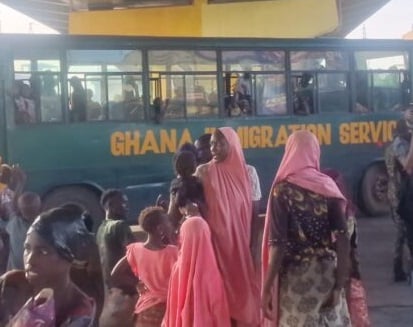The Ghana Immigration Service (GIS) has initiated a nationwide operation to address the pervasive issue of street begging by undocumented migrants, primarily focusing on individuals from Niger and Nigeria. This operation has resulted in the detention of 2,244 individuals, a significant majority of whom, 819, are Nigerien nationals, highlighting the prominent role of regional migration within Ghana’s informal urban economy. The operation, while aimed at curbing street begging and dismantling related criminal networks, has encountered a significant logistical hurdle, forcing a temporary suspension of further arrests due to overcrowding at the GIS’s detention facilities. This pause underscores the complexity of managing large-scale immigration enforcement and repatriation efforts within a framework that respects the rights of all migrants.
The GIS has emphasized its commitment to conducting the operation humanely and in accordance with international human rights standards. Detainees are receiving essential provisions, including meals, medical care, and other necessary services. Furthermore, the GIS has implemented procedures to ensure proper screening, profiling, and security checks for each individual, along with segregation by gender and age to maintain appropriate living conditions. These meticulous processes, while crucial for upholding human rights, contribute to the operational strain on the immigration system, further necessitating the temporary halt to new detentions. This demonstrates the difficult balance between enforcing immigration laws and ensuring dignified treatment for migrants, even those in violation of said laws.
The temporary suspension of arrests, announced in a press release on May 19, 2025, is specifically aimed at preventing further congestion at the main holding center at the GIS National Headquarters. The decision is a pragmatic response to the influx of detainees, exceeding the current capacity of the facility. Despite this pause, the GIS has reaffirmed its commitment to continuing the operation in due course. This underlines the seriousness of the government’s intent to address the issue of street begging, viewing it not just as a social nuisance, but also potentially as a breeding ground for illicit activities, prompting their focus on dismantling any associated criminal networks.
The repatriation process has already commenced for a substantial number of detainees. To date, 925 individuals have been returned to their countries of origin, with the vast majority, 819, being repatriated to Niger, along with 106 Nigerians. This demonstrates the cooperative efforts between Ghana and its regional neighbors in addressing the ongoing challenges of cross-border migration and its associated societal implications. The remaining detainees are currently undergoing processing for eventual repatriation, a complex and resource-intensive undertaking that requires meticulous documentation and coordination between authorities.
The GIS has actively sought to foster public understanding and support for its operation, emphasizing its commitment to professional and humane treatment of all individuals involved. The Service has called upon the media, civil society organizations, and the general public to continue backing its efforts, recognizing the multifaceted challenges posed by cross-border migration. This appeal reflects the GIS’s understanding that successful implementation of migration control requires not only effective law enforcement but also societal acceptance and a collective responsibility to address the root causes of undocumented migration and street begging.
This temporary halt to detentions serves as a crucial juncture, enabling the GIS to manage the logistical challenges while reaffirming its dedication to tackling the issue of street begging in a sustainable and rights-respecting manner. It also highlights the broader regional dynamics at play, particularly the influx of migrants from neighboring countries, and underscores the need for comprehensive, long-term solutions that address the root causes of this phenomenon. The resumption of the operation, while inevitable given the government’s commitment, will undoubtedly necessitate careful planning and efficient resource allocation to ensure its effectiveness and adherence to human rights standards.


